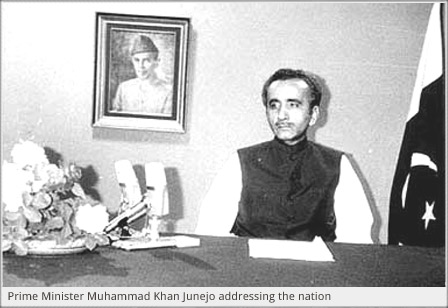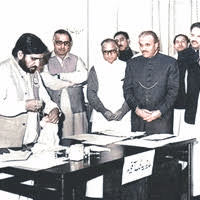After the 1984 referendum, General Zia announced elections of the National and Provincial Assemblies in February 1985. The elections were to be held on a non-party basis, which was legalized through an amendment to the 1973 Constitution. Each candidate had to be supported by at least 50 people to be able to contest in the elections. In a nationwide speech on January 12, 1985, General Zia also announced various other conditions for the elections. Amendments were made in the Political Parties Act of 1962. These amendments affected all political parties. The opposition parties, M. R. D., boycotted the elections, as their demands for party-based elections and restoration of the 1973 Constitution were not met.
The elections for the National and Provincial Assemblies were held in 1985 on February 25 and 28, respectively. The successful boycott of the 1984 referendum caused the M. R. D. to miscalculate their next step. Being confident of public opinion, they boycotted these elections as well. Contrary to expectations, the voters turned to the polls in large numbers. Surprisingly, many political leaders, including former Members of National and Provincial Assemblies, and Advisors, who had seemed popular in their appeals, could not win from their constituencies. The people elected many new faces. The M. R. D. soon realized that it had miscalculated badly, that it should have fought the elections on Zia’s terms. An alternative leadership was in place with many of the old political leaders routed out.

The general elections to the National and Provincial Assemblies were held peacefully and with a large participation of the people. Total voter turnout for the National Assembly was 53.69 percent. In the Provincial Assemblies elections, where the constituencies were smaller and the contest harder, the turnout of the voters was even better. It was 57.37 percent nationwide. The newly elected National Assembly was to replace the Majlis-i-Shoora and was to have legislative powers as well. Muhammad Khan Junejo was appointed as the Prime Minister and he formed the government. It was this newly elected Assembly that set the tone for later years by incorporating the controversial Eighth Amendment in the Constitution of Pakistan.
This article was last updated on Sunday, June 01, 2003






